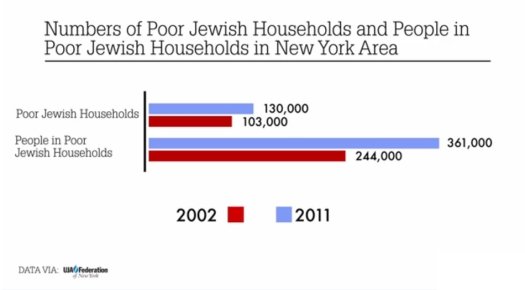
Free Loan Society Sets Sights on Brooklyn Chasidic Community
An agency that has been offering interest free loans to those in need for over 100 years has recently set its sights on a particular demographic, Brooklyn’s chasidic community, lending over $1.5 million dollars over the past several years to locally owned businesses.
“Our history has always been lending money for general emergency needs and helping very small businesses,” Shana Novick, executive director of the Hebrew Free Loan Society, told VIN News. “You want to make those interest free loans to the people who need it the most and increasingly, studies are showing that the largest group of poor Jews in the city is the chasidic community.”
While they may be called micro-loans in today’s terminology, the concept of lending seed money to small businesses is nothing new, according to Novick.
“We are 120 years old and when I speak to people in the general community they don’t know about gamachs and gemilas chesed, but what we do comes out of centuries of Jewish tradition. In fact, our original corporate name was the Hebrew Gemilas Chasadim Association.”
The Hebrew Free Loan Society was founded at Manhattan’s Vilna Synagogue in 1892 with just $95 of working capital and 25 years later, it became one of the founding organizations of what would later become the UJA – Federation. While the HFLS is a non-sectarian agency, according to Novick, it has always focused on the needs of the Jewish community.
“We come from the centuries old tradition articulated in the Mishne Torah by the Rambam who says that the highest form of tzedaka is to help someone become self sufficient,” explained Novick. “One of the best ways to help low to moderate income people in a developed economy is by offering them help in business.”
The HFLS has set its sights on the chasidic community in both Williamsburg and Borough Park and has partnered up with two local community organizations: the United Jewish Organizations in Williamsburg and Mishkan Yecheskel in Borough Park. Additionally, the HFLS offers free business classes to budding entrepreneurs, with separate classes for men and women.
“One of the things that trips people up is a lack of business education,” observed Novick. “These are not MBA’s and these are people who probably haven’t taken any college courses. In order to position them for success, we offer basic business courses. If they do the reading and they do the homework they will end up with the skills to operate a simple business.”
The classes rotate seasonally between Williamsburg and Borough Park and has also attracted the attention of Crown Heights residents. The women’s classes are offered over a period of twelve weeks, held on Tuesday afternoons from 10 to 2, a time when children are either in school or can be placed with a babysitter. Classes for men are more condensed, meeting Monday and Wednesday nights from 7 to 9:30 PM over a seven week session. Novick described the classes, which are each led by two facilitators, as highly interactive, including a full curriculum, break out groups and exercises to be performed before, during and after the classes.
“For the women, it is more like a hobby, an intersection of their talents and their passions, where they are aiming to add to the family parnassa. By the men, they are aiming to be the family parnasa,” explained Novick.
Facilitator Tiffany Goldberg found that many of the women in her classes were able to channel the same skill set they used to parent their large families into their business plans.
“They are natural born managers, organizers who know how to set a goal and reach that goal by taking chronological steps,” said Goldberg who found that the close knit nature of the chasidic community gave the women an added advantage.
“Their dynamic of cooperating with each other in the outside world really translates well into the classroom,” reported Goldberg. “They all share in each other’s business and are supportive of each other. If you were taking a sampling from the general population of the secular world, you would be hard pressed to find that level of cohesion.”
Class schedules run around the Jewish holidays and Novick expects the next round of classes to begin after the yomim tovim. While the women’s classes began in the spring of 2011, the men’s classes have been running since 2008. Over that period of time 215 men and 102 women have graduated from the program.
“We are certainly not the only gamach out there but I don’t think that anyone else is doing this kind of course work within the frum community,” said Novick.
To date, the HFLS has loaned out $1.6 million to 75 businesses in the chasidic community, lending each approved business up to $25,000 for a term of up to 60 months.
“That’s the beauty of a gamach,” said Novick. “A little goes a long way.”
















crown heights
what about crown heights
Hfls
Gave me a scholarship to go to college 13 years ago.
So interesting how much has changed. Those of us who went to college were looked down upon and told that we wouldn’t get good shidduchim.
Dont Understand..
According to the video ‘40% of the Hasidic community is living in poverty’ and growing exponentially as the graphs above show over 10 years. How is this sustainable in a place like Brooklyn where the standard of living is incredibly high? The loan program looks like a great start, but will it address the overall issue of 40% poverty?